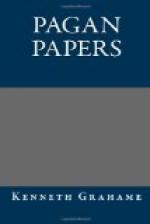In book-buying you not infrequently condone an extravagance by the reflection that this particular purchase will be a good investment, sordidly considered: that you are not squandering income but sinking capital. But you know all the time that you are lying. Once possessed, books develop a personality: they take on a touch of warm human life that links them in a manner with our kith and kin. Non angli sed Angeli was the comment of a missionary (old style) on the small human duodecimos exposed for sale in the Roman market-place; and many a buyer, when some fair-haired little chattel passed into his possession, must have felt that here was something vendible no more. So of these you may well affirm Non libri sed liberi; children now, adopted into the circle, they shall be trafficked in never again.
There is one exception which has sadly to be made — one class of men, of whom I would fain, if possible, have avoided mention, who are strangers to any such scruples. These be Executors — a word to be strongly accented on the penultimate; for, indeed, they are the common headsmen of collections, and most of all do whet their bloody edge for harmless books. Hoary, famous old collections, budding young collections, fair virgin collections of a single author — all go down before the executor’s remorseless axe. He careth not and he spareth not. ``The iniquity of oblivion blindly scattereth her poppy,’’ and it is chiefly by the hand of the executor that she doth love to scatter it. May oblivion be his portion for ever!
Of a truth, the foes of the book-lover are not few. One of the most insidious, because he cometh at first in friendly, helpful guise, is the bookbinder. Not in that he bindeth books — for the fair binding is the final crown and flower of painful achievement — but because he bindeth not: because the weary weeks lapse by and turn to months, and the months to years, and still the binder bindeth not: and the heart grows sick with hope deferred. Each morn the maiden binds her hair, each spring the honeysuckle binds the cottage-porch, each autumn the harvester binds his sheaves, each winter the iron frost binds lake and stream, and still the bookbinder he bindeth not. Then a secret voice whispereth: ``Arise, be a man, and slay him! Take him grossly, full of bread, with all his crimes broad-blown, as flush as May; At gaming, swearing, or about some act That hath no relish of salvation in it!’’ But when the deed is done, and the floor strewn with fragments of binder — still the books remain unbound. You have made all that horrid mess for nothing, and the weary path has to be trodden over again. As a general rule, the man in the habit of murdering bookbinders, though he performs a distinct service to society, only wastes his own time and takes no personal advantage.




